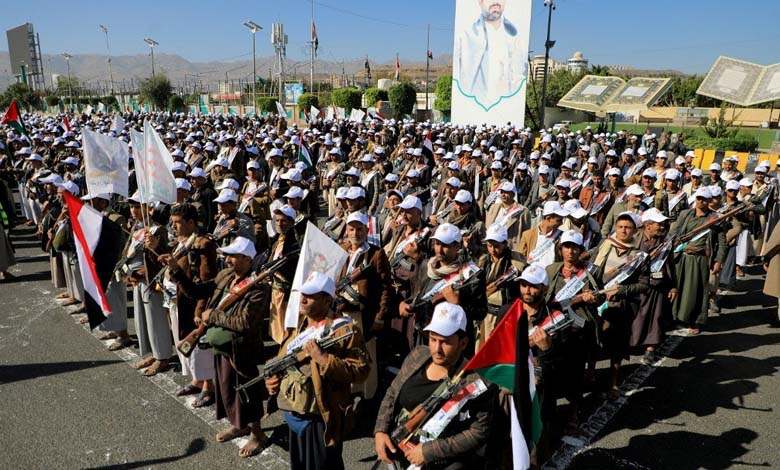Houthis Continue to Threaten Israel despite Gaza Ceasefire
The Iran-backed group persists in claiming responsibility for attacks targeting the Jewish state and maritime navigation in the Red Sea.

The Iran-backed Houthis in Yemen have vowed to continue their confrontation with Israel, despite the announcement of a ceasefire agreement to end the war in Gaza. This agreement, cited by the Houthis as a justification for their ongoing drone and ballistic missile attacks on Israel, has not prevented Tel Aviv from intercepting several projectiles launched from Yemen.
-
Painful blows to the Houthis: US-British airstrikes on Sanaa and Amran
-
The Houthis Struggle to Avoid al-Assad’s Fate… What Are They Doing?
Following devastating Israeli strikes that weakened both the Palestinian Hamas and the Lebanese Hezbollah, the Houthis now appear to be the last stronghold of the “resistance axis” supported by Iran. They have pledged to continue opposing Israel.
Despite the announced ceasefire between Israel and Hamas in Gaza, the Houthis have continued to claim responsibility for launching projectiles toward Israel. They also allege an attack on the U.S. aircraft carrier “Harry Truman” in the northern Red Sea, although this has not been confirmed by U.S. authorities.
-
A Last Card against Isolation: The Houthis Resort to the “Sanaa Conference”
-
“The Bells of Damascus” Alarm the Houthis: Yemeni Calls Intensify to “Uproot the Militias”
Explosions were heard in Jerusalem’s skies after warning sirens were activated in the city and central Israel on Saturday morning. According to the Israeli military, a projectile was fired from Yemen.
Sirens sounded in Jerusalem around 10:20 AM (08:20 GMT), followed by explosions. Shortly before, sirens had been triggered in central Israel in response to an intercepted projectile, according to a military statement.
Meanwhile, Israeli Channel 12 reported that air traffic at Ben Gurion Airport was suspended following the missile launch from Yemen.
-
Houthis and Al-Qaeda: A Grim Record of Violating Yemenis’ Rights
-
Canada Adds Houthis to Terror List: Reasons and Consequences
Thomas Juneau, a professor of political science at the University of Ottawa and an expert on Yemeni affairs, stated that the Houthis “have become stronger and are now an indispensable member of the resistance axis.” With the weakening of Hezbollah and Hamas after more than a year of bloody conflict with Israel in Lebanon and Gaza, “they have become more critical for Iran,” he added.
He noted that their fight against Israel and the United States during the Gaza war has garnered renewed popularity in Yemen, a poor country where most of the 30 million residents strongly support the Palestinian cause.
-
Houthis on Canada’s Terrorism List: Implications and Expectations
-
Iran Relies on Houthis and Iraqi Militias to Support Gaza
Since the fierce war between Israel and Hamas began on October 7, 2023, following an unprecedented Hamas attack on southern Israel, the Houthis have launched dozens of missiles and drones toward Israel. They have also targeted ships they claim are linked to Israel or headed for its ports in the Red Sea.
Neither Israel nor the United States has managed to halt these attacks despite multiple violent strikes, sometimes with British involvement, against Houthi positions in Yemen.
-
The Houthis escalate hostility towards Israel as the West responds with harsh strikes: What’s the story?
-
With Deceptive Promises… Houthis “Recruit” Yemenis to Fight in Ukraine
Since 2014, the Houthis in Yemen have been engaged in a bloody conflict with the forces loyal to the Yemeni government. Hailing from northern Yemen, they initially seized control of the capital, Sanaa, before expanding their control over large swathes of territory. They are supported by Iran.
On Thursday, their leader, Abdelmalek al-Houthi, threatened that attacks on Israel would continue if the Jewish state did not abide by the ceasefire agreement in Gaza. In a lengthy speech broadcast by the “Al-Massira” TV channel affiliated with them, he said, “We will closely follow the stages of implementing the agreement. Any Israeli retreat, massacres, or siege will lead us to be immediately ready to provide military support to the Palestinian people.”
-
The Houthis are preparing to leave Hodeidah… What are they doing?
-
UN Security Council Extends Sanctions on Houthis in Yemen: Details
Yemeni affairs expert Mohamed al-Basha believes the speech is “full of defiance,” noting that al-Houthi stated his movement would continue to mobilize fighters and develop its military arsenal in preparation for the “next round of confrontation.”
As has been the case every week for the past 15 months, tens of thousands of Yemenis gathered in central Sanaa on Friday to support the Palestinians, just two days before the ceasefire agreement came into effect.
-
What Are the Risks of Increasing Cooperation between the Houthis and Somalia’s al-Shabaab? Observers Respond
-
Due to the Brotherhood and the Houthis… Disasters and Tragedies on the Roads of Taiz
During the demonstration, the Houthi military spokesman, Brigadier General Yahya Saree, announced that his movement had carried out four attacks using rockets and drones on “Um al-Rashrash, in southern occupied Palestine, in the areas of Jaffa and Ashkelon,” as well as targeting “the US aircraft carrier USS Harry Truman in the northern Red Sea.”
However, Israel did not confirm the launch of rockets and drones, nor did it announce any interception, as is typically the case when faced with Houthi attacks. Similarly, the United States did not confirm any attack on its fleet.
-
The UN Exposes the “Opportunistic Alliance”: Collaboration between Houthis and Al-Qaeda in Yemen
-
Houthis Close Religious Centers That Disagree with Their Doctrine in Three Governorates
Zaid al-Astout, who participated in the demonstration, stated, “Our outing today is in itself a victory after those victories and the ballistic missiles that reached deep into the Zionist entity, and our drones that forced them to stop the aggression in Gaza.”
Houthi activist Khaled al-Matri said he supported the ceasefire agreement, but added, “We will not surrender until the Zionist entity is gone, God willing.”
-
Houthis and Humanitarian Organization Employees: Information in Exchange for Freedom
-
Following in Daesh’s Footsteps… The Houthis Spoil Yemeni Celebrations
Behind him, the demonstrators chanted “Death to America, death to Israel.”
Expert Juno believes the Houthi attacks might stop in the short term but doubts that this will be “permanent.” He adds, “Given their regional goals and ideology, it is likely that they will again use the threat of launching attacks in the Red Sea in the future to pressure Israel,” or even the United States or Saudi Arabia.
-
Houthis Don’t Make Their Own Decisions… Iran Launches Attacks and Attributes Them to Houthis… A Senior Official Reveals the Truth
-
Growing concerns about the Houthis turning Yemen into a battleground for Iran’s wars… Details












